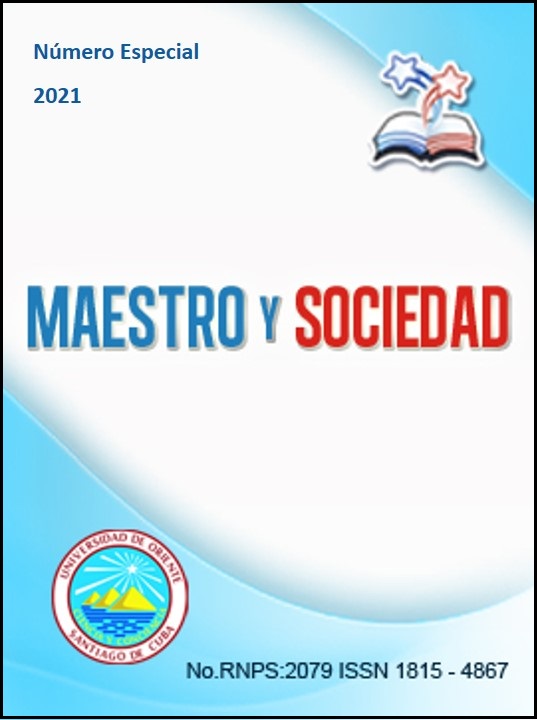Critical Thinking: design of effective programs
Array
Keywords:
Critical thinking, program, designAbstract
The objective of this study is to analyze the common characteristics of critical thinking training programs that have been applied over the last ten years, given the growing scientific production around critical thinking and the need to improve training profiles in this area. competence. The analysis has focused on quasi-experimental studies with the application of pre and post tests in formal teaching contexts. The results show that for the elaboration of these programs it is necessary to have defined training profiles, trainer profile, and student-centered methodology and learning activities through problem-based learning, project-based learning, and case studies. The results show that the programs of recent years have been oriented to a constructivist or cognitive model, with highly significant learning activities, contextualized and consistent with the study plans and complementary to the socio-labor needs of a labor market that requires highly qualified workers.
References
2. Betancourth, S., Muñoz, K. y Rosas, T. (2017). Evaluación del pensamiento crítico en estudiantes de educación superior de la región de Atacama-Chile. Prospectiva. Revista de Trabajo Social e intervención social, (23), 199-223. Doi: https://doi.org/10.25100/prts.v0i23.4594
3. Creswell, J. (2014). Research Design: Qualitative, Quantitative, and Mixed Methods Approaches. California, EE. UU: Sage publications.
4. Cui, L., Zhu, Y., Qu, J., Tie1, L., Wang, Z. (2021). Psychometric properties of the critical thinking disposition assessment test amongst medical students in China: a cross-sectional study. Medical Education 21(10). https://doi.org/10.1186/s12909-020-02437-2
5. Dávila, M. (2018). Pensamiento crítico y rendimiento académico en los ingresantes del curso de estadística I en la Facultad de Ingeniería Económica, Estadística y Ciencias Sociales. Universidad Nacional de Ingeniería–2017. (Tesis de maestría). Universidad Peruana Cayetano Heredia, Lima, Perú.
6. Deroncele, A., Nagamine, M., y Medina, D. (2020a). Desarrollo del pensamiento crítico. Maestro y Sociedad, 17(3), 532-546. https://maestroysociedad.uo.edu.cu/index.php/MyS/article/view/522010
7. Deroncele, A., Nagamine, M., y Medina, D. (2020b). Bases epistemológicas y metodológicas para el abordaje del pensamiento crítico en la educación peruana. Revista Inclusiones, 7(Número Especial), 68-87. https://revistainclusiones.org/index.php/inclu/article/view/30211.
8. Din, M. (2020). Evaluating university students critical thinking ability as reflected in their critical reading skill: A study at bachelor level in Pakistan. Thinking Skills and Creativity, 35(1), 1-11. https://doi.org/10.1016/j.tsc.2020.100627
9. Erma1, A., Dewi, H. y Giarti, S. (2020). Improving Critical Thinking Skills Using Problem Based Learning on the Media Flash Card. International Journal for Educational and Vocational Studies 1(6) 619-622. DOI: https://doi.org/10.29103/ijevs.v1i6.1671
10. Fandos, M., Renta, A, Jiménez, J. y González, A. (2017). Análisis sobre el aprendizaje y la aplicación de las competencias generales en el contexto laboral. Estrategias de colaboración entre la formación profesional, la universidad y la empresa. Educar 53(2), 333-355. http://dx.doi.org/10.1590/2175-3539/2015/02111072
11. Gómez, D. y De la Herrán, A. (2018). Estudios sobre propuestas y experiencias de innovación educativa. Revista de currículum y formación del profesorado 22(4). 269-285. https://doi.org/10.30827/profesorado.v22i4.8416
12. Hernández, R., Fernández, C., y Baptista, P. (2014). Metodología de la investigación. McGraw-Hill.
13. Lara, V., Aviles, J., y Olivares, S. (2017). Desarrollo del pensamiento crítico mediante la aplicación del Aprendizaje Basado en Problemas. Psicología Escolar e Educacional 21(1), 65-77. http://dx.doi.org/10.1590/2175-3539/2015/02111072
14. Laso, S., Ruiz, M., Marbán, J. (2020). Impacto de un programa de intervención metacognitivo sobre la Conciencia Ambiental de docentes de Primaria en formación inicial. Revista Eureka sobre Enseñanza y Divulgación de las Ciencias 16(2), 2501. 10.25267/Rev_Eureka_ensen_divulg_cienc.2019.v16.i2.2501.
15. Lazarte, K. (2018). Inteligencia emocional y aprendizaje cooperativo en el pensamiento crítico de estudiantes de secundaria VII ciclo. (Tesis de doctorado). Universidad Cesar Vallejo, Lima, Perú. https://repositorio.ucv.edu.pe/bitstream/handle/20.500.12692/23814/Lazarte_SKC.pdf?sequence=1&isAllowed=y
16. Loayza-Borda, J. (2021). El pensamiento crítico como habilidad blanda en la educación. Maestro y Sociedad, 18(3), 1137-1148. https://maestroysociedad.uo.edu.cu/index.php/MyS/article/view/5399
17. Massip, M., Castellví, J. y González-Valencia, G. (2020). Entre la emoción y el pensamiento crítico un estudio con profesorado de ciencias sociales en formación. Octaedro.
18. Medina Zuta, P. y Deroncele Acosta, A. (2019a). La construcción científico-textual en el posgrado: el desafío de la transdisciplinariedad y la reflexividad. Revista Maestro y Sociedad, 16(4), 829-838. https://maestroysociedad.uo.edu.cu/index.php/MyS/article/view/5015
19. Medina Zuta, P. y Deroncele Acosta, A. (2020a). La práctica investigativa dialógico-reflexiva para orientar la problematización como operador epistémico de la construcción científico-textual. Revista Inclusiones, 7(2), 160-174
20. Medina Zuta, P. y Deroncele Acosta, A. (2020b). La práctica dialógico-reflexiva: una experiencia formativa en los procesos de construcción científico-textual en el postgrado. Órbita Pedagógica, 7(1), 37-46.
21. Medina, F. (2017). Programa Critical para desarrollar pensamiento crítico en estudiantes de cuarto de secundaria de una Institución Educativa Del Callao. http://repositorio.usil.edu.pe/bitstream/USIL/2997/1/2017_Medina_Programa-critical-para-pensamiento-critico.pdf
22. Novella, R., Repeto, A., Robina C. y Rucci, G. (2018). Millennials en América Latina y el Caribe: ¿trabajar o estudiar? Banco Interamericano de Desarrollo.
23. Ossa, C. y Diaz, A. (2017). Enfoques intraindividual e interindividual en programas de pensamiento crítico. Psicol. Esc. Educ. 21(3). https://doi.org/10.1590/2175-353920170213111121
24. Palacios, M. L. y Deroncele, A. (2021). La Dimensión Socioemocional de la Competencia Digital en el marco de la Ciudadanía Global. Maestro y Sociedad, 18(1), 119-131. https://maestroysociedad.uo.edu.cu/index.php/MyS/article/view/5318
25. Palma, M. Ossa, C. y San Martín, N. (2017). Propuesta de un programa de pensamiento crítico para estudiantes de pedagogía. Enseñanza de las Ciencias. Extraordinario 1(1) 2833-2837. https://www.raco.cat/index.php/Ensenanza/article/download/336968/427778/0
26. Reng, X., Tong, Y. & Peng, P. (2020). Critical thinking predicts academic performance beyond general cognitive ability: Evidence from adults and children. Intelligence, 82(5). https://doi.org/10.1016/j.intell.2020.101487
27. Winthrop, E.,y McGivney (2016). Skills for a Changing World: Advancing Quality Learning for Vibrant Societies. https://brook.gs/3CGXA0b
Published
How to Cite
Issue
Section
License
This journal provides immediate open access to its content, based on the principle that offering the public free access to research helps a greater global exchange of knowledge. Each author is responsible for the content of each of their articles.



























 Universidad de Oriente
Universidad de Oriente 